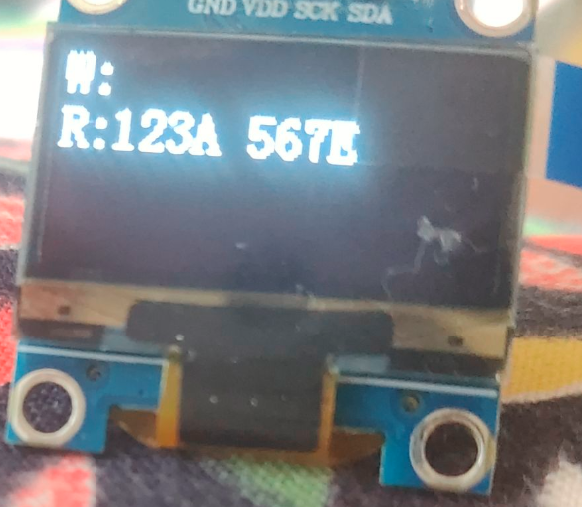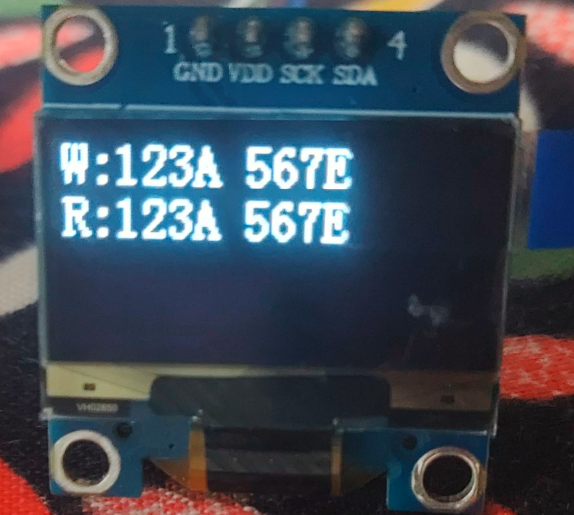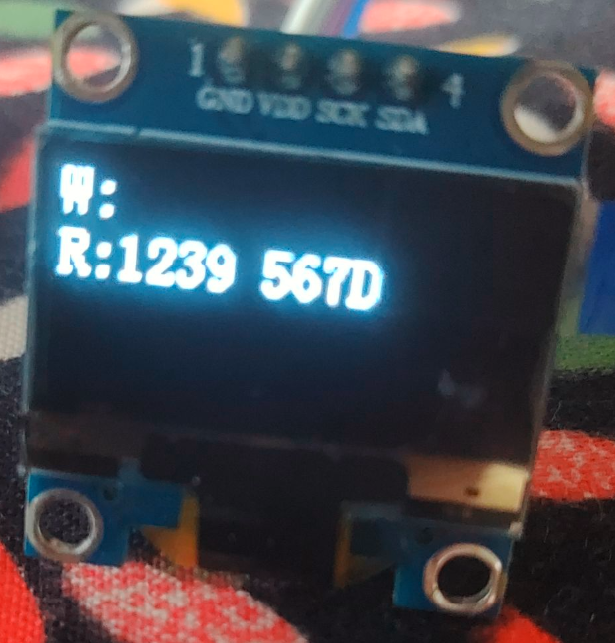【自学嵌入式:stm32单片机】读写备份寄存器
读写备份寄存器
接线图

这是江科大的接线图,我的版本还是使用硬件I2C与OLED屏幕通信,由于用的是硬件I2C2,所以按键键码值只读取GPIO_Pin_1就行,PB11被占用用来发送I2C信号,把相关代码注释即可
代码实现
标准库实现
已开源到:https://gitee.com/qin-ruiqian/jiangkeda-stm32
Key.c
#include "stm32f10x.h" // Device header
#include "Delay.h"
//#include "Serial.h"
//初始化按键
void Key_Init(void)
{
//打开APB2总线GPIOB外设端口,并开启时钟
RCC_APB2PeriphClockCmd(RCC_APB2Periph_GPIOB, ENABLE);
GPIO_InitTypeDef GPIO_InitStructure;
GPIO_InitStructure.GPIO_Mode = GPIO_Mode_IPU; //读取按键,选择上拉输入
GPIO_InitStructure.GPIO_Pin = GPIO_Pin_1; //选的是PB1
GPIO_InitStructure.GPIO_Speed = GPIO_Speed_50MHz;
GPIO_Init(GPIOB, &GPIO_InitStructure);
//Serial_Init();
}
//读取按键值
uint8_t Key_GetNum(void)
{
uint8_t KeyNum = 0;
//Serial_Printf("KeyNumStart:%d\r\n", KeyNum);
if(GPIO_ReadInputDataBit(GPIOB, GPIO_Pin_1) == 0) //读取PB1口的电平
{
Delay_ms(20); //消抖
while(GPIO_ReadInputDataBit(GPIOB, GPIO_Pin_1) == 0); //直到按键松手
Delay_ms(20); //消抖
KeyNum = 1;
}
//Serial_Printf("KeyNumEnd:%d\r\n", KeyNum);
// if(GPIO_ReadInputDataBit(GPIOB, GPIO_Pin_11) == 0) //读取PB11口的电平
// {
// Delay_ms(20); //消抖
// while(GPIO_ReadInputDataBit(GPIOB, GPIO_Pin_11) == 0); //直到按键松手
// Delay_ms(20); //消抖
// KeyNum = 2;
// }
return KeyNum;
}
main.c
#include "stm32f10x.h" // Device header
#include "Delay.h"
#include "MYOLED.h"
#include "Key.h"
//#include "Serial.h"
uint8_t KeyNum;
uint16_t ArrayWrite[] = {0x1234, 0x5678};
uint16_t ArrayRead[2]; //用于存放写入和读取数组的数组
int main(void)
{
//Serial_Init();
MYOLED_Init();
//Serial_Printf("OLED屏幕初始化完成\r\n");
Key_Init();
//Serial_Printf("按键初始化完成\r\n");
MYOLED_ShowString(0,0,"W:");
//Serial_Printf("OLED屏幕'W:'显示完成\r\n");
MYOLED_ShowString(0,1,"R:");
//BKP代码非常少,不进行封装了,直接在主函数中演示
//第一步,开启PWR和BKP的时钟
//第二部,使用PWR的一个函数,使能对BKP和RTC的访问
RCC_APB1PeriphClockCmd(RCC_APB1Periph_PWR, ENABLE); //开启PWR时钟
RCC_APB1PeriphClockCmd(RCC_APB1Periph_BKP, ENABLE); //开启BKP时钟
PWR_BackupAccessCmd(ENABLE); //使能对BKP和RTC的访问
//BKP_WriteBackupRegister(BKP_DR1, 0x1234); //写备份寄存器DR1
// MYOLED_ShowHexNum(0,0,BKP_ReadBackupRegister(BKP_DR1),4); //读备份寄存器DR1,并用OLED屏幕显示
//每次都读取一下:
ArrayRead[0] = BKP_ReadBackupRegister(BKP_DR1);
ArrayRead[1] = BKP_ReadBackupRegister(BKP_DR2);
MYOLED_ShowHexNum(2,1,ArrayRead[0],4);
MYOLED_ShowHexNum(7,1,ArrayRead[1],4);
while (1)
{
KeyNum = Key_GetNum();
//Serial_Printf("KeyNum:%d\r\n", KeyNum);
if(KeyNum == 1)
{
ArrayWrite[0]++;
ArrayWrite[1]++;
BKP_WriteBackupRegister(BKP_DR1, ArrayWrite[0]);
BKP_WriteBackupRegister(BKP_DR2, ArrayWrite[1]);
MYOLED_ShowHexNum(2,0,ArrayWrite[0],4);
MYOLED_ShowHexNum(7,0,ArrayWrite[1],4);
}
ArrayRead[0] = BKP_ReadBackupRegister(BKP_DR1);
ArrayRead[1] = BKP_ReadBackupRegister(BKP_DR2);
MYOLED_ShowHexNum(2,1,ArrayRead[0],4);
MYOLED_ShowHexNum(7,1,ArrayRead[1],4);
}
}
HAL库实现
已开源到:https://gitee.com/qin-ruiqian/jiangkeda-stm32-hal
IDE关于RTC的设置如下图:

Key.c
/*
* Key.c
*
* Created on: Aug 9, 2025
* Author: Administrator
*/
#include "stm32f1xx_hal.h"
//读取按键值
uint8_t Key_GetNum(void)
{
uint8_t KeyNum = 0;
if(HAL_GPIO_ReadPin(GPIOB, GPIO_PIN_1) == 0)
{
HAL_Delay(20); //消抖
while(HAL_GPIO_ReadPin(GPIOB, GPIO_PIN_1) == 0); //直到按键松手
HAL_Delay(20); //消抖
KeyNum = 1;
}
// if(HAL_GPIO_ReadPin(GPIOB, GPIO_PIN_11) == 0)
// {
// HAL_Delay(20); //消抖
// while(HAL_GPIO_ReadPin(GPIOB, GPIO_PIN_11) == 0); //直到按键松手
// HAL_Delay(20); //消抖
// KeyNum = 2;
// }
return KeyNum;
}
main.c
/* USER CODE BEGIN Header */
/**
******************************************************************************
* @file : main.c
* @brief : Main program body
******************************************************************************
* @attention
*
* Copyright (c) 2025 STMicroelectronics.
* All rights reserved.
*
* This software is licensed under terms that can be found in the LICENSE file
* in the root directory of this software component.
* If no LICENSE file comes with this software, it is provided AS-IS.
*
******************************************************************************
*/
/* USER CODE END Header */
/* Includes ------------------------------------------------------------------*/
#include "main.h"
#include "i2c.h"
#include "rtc.h"
#include "gpio.h"
/* Private includes ----------------------------------------------------------*/
/* USER CODE BEGIN Includes */
#include "MYOLED.h"
#include "Key.h"
/* USER CODE END Includes */
/* Private typedef -----------------------------------------------------------*/
/* USER CODE BEGIN PTD */
/* USER CODE END PTD */
/* Private define ------------------------------------------------------------*/
/* USER CODE BEGIN PD */
/* USER CODE END PD */
/* Private macro -------------------------------------------------------------*/
/* USER CODE BEGIN PM */
/* USER CODE END PM */
/* Private variables ---------------------------------------------------------*/
/* USER CODE BEGIN PV */
uint8_t KeyNum;
uint16_t ArrayWrite[] = {0x1234, 0x5678};
uint16_t ArrayRead[2]; //用于存放写入和读取数组的数组
/* USER CODE END PV */
/* Private function prototypes -----------------------------------------------*/
void SystemClock_Config(void);
/* USER CODE BEGIN PFP */
/* USER CODE END PFP */
/* Private user code ---------------------------------------------------------*/
/* USER CODE BEGIN 0 */
/* USER CODE END 0 */
/**
* @brief The application entry point.
* @retval int
*/
int main(void)
{
/* USER CODE BEGIN 1 */
/* USER CODE END 1 */
/* MCU Configuration--------------------------------------------------------*/
/* Reset of all peripherals, Initializes the Flash interface and the Systick. */
HAL_Init();
/* USER CODE BEGIN Init */
/* USER CODE END Init */
/* Configure the system clock */
SystemClock_Config();
/* USER CODE BEGIN SysInit */
/* USER CODE END SysInit */
/* Initialize all configured peripherals */
MX_GPIO_Init();
MX_I2C2_Init();
MX_RTC_Init();
/* USER CODE BEGIN 2 */
MYOLED_SetI2CHandleBeforeInit(&hi2c2); //一定别忘了加,这里得把句柄传进去
MYOLED_Init();
MYOLED_ShowString(0,0,"W:");
MYOLED_ShowString(0,1,"R:");
//每次都读取一下:
ArrayRead[0] = HAL_RTCEx_BKUPRead(&hrtc, RTC_BKP_DR1);// HAL_RTCEx_BKUPWrite(&hrtc, RTC_BKP_DR1, Data);
ArrayRead[1] = HAL_RTCEx_BKUPRead(&hrtc, RTC_BKP_DR2);
MYOLED_ShowHexNum(2,1,ArrayRead[0],4);
MYOLED_ShowHexNum(7,1,ArrayRead[1],4);
/* USER CODE END 2 */
/* Infinite loop */
/* USER CODE BEGIN WHILE */
while (1)
{
KeyNum = Key_GetNum();
if(KeyNum == 1)
{
ArrayWrite[0]++;
ArrayWrite[1]++;
HAL_RTCEx_BKUPWrite(&hrtc, RTC_BKP_DR1, ArrayWrite[0]);
HAL_RTCEx_BKUPWrite(&hrtc, RTC_BKP_DR2, ArrayWrite[1]);
MYOLED_ShowHexNum(2,0,ArrayWrite[0],4);
MYOLED_ShowHexNum(7,0,ArrayWrite[1],4);
}
ArrayRead[0] = HAL_RTCEx_BKUPRead(&hrtc, RTC_BKP_DR1);;
ArrayRead[1] = HAL_RTCEx_BKUPRead(&hrtc, RTC_BKP_DR2);
MYOLED_ShowHexNum(2,1,ArrayRead[0],4);
MYOLED_ShowHexNum(7,1,ArrayRead[1],4);
/* USER CODE END WHILE */
/* USER CODE BEGIN 3 */
}
/* USER CODE END 3 */
}
/**
* @brief System Clock Configuration
* @retval None
*/
void SystemClock_Config(void)
{
RCC_OscInitTypeDef RCC_OscInitStruct = {0};
RCC_ClkInitTypeDef RCC_ClkInitStruct = {0};
RCC_PeriphCLKInitTypeDef PeriphClkInit = {0};
/** Initializes the RCC Oscillators according to the specified parameters
* in the RCC_OscInitTypeDef structure.
*/
RCC_OscInitStruct.OscillatorType = RCC_OSCILLATORTYPE_LSI|RCC_OSCILLATORTYPE_HSE;
RCC_OscInitStruct.HSEState = RCC_HSE_ON;
RCC_OscInitStruct.HSEPredivValue = RCC_HSE_PREDIV_DIV1;
RCC_OscInitStruct.HSIState = RCC_HSI_ON;
RCC_OscInitStruct.LSIState = RCC_LSI_ON;
RCC_OscInitStruct.PLL.PLLState = RCC_PLL_ON;
RCC_OscInitStruct.PLL.PLLSource = RCC_PLLSOURCE_HSE;
RCC_OscInitStruct.PLL.PLLMUL = RCC_PLL_MUL9;
if (HAL_RCC_OscConfig(&RCC_OscInitStruct) != HAL_OK)
{
Error_Handler();
}
/** Initializes the CPU, AHB and APB buses clocks
*/
RCC_ClkInitStruct.ClockType = RCC_CLOCKTYPE_HCLK|RCC_CLOCKTYPE_SYSCLK
|RCC_CLOCKTYPE_PCLK1|RCC_CLOCKTYPE_PCLK2;
RCC_ClkInitStruct.SYSCLKSource = RCC_SYSCLKSOURCE_PLLCLK;
RCC_ClkInitStruct.AHBCLKDivider = RCC_SYSCLK_DIV1;
RCC_ClkInitStruct.APB1CLKDivider = RCC_HCLK_DIV2;
RCC_ClkInitStruct.APB2CLKDivider = RCC_HCLK_DIV1;
if (HAL_RCC_ClockConfig(&RCC_ClkInitStruct, FLASH_LATENCY_2) != HAL_OK)
{
Error_Handler();
}
PeriphClkInit.PeriphClockSelection = RCC_PERIPHCLK_RTC;
PeriphClkInit.RTCClockSelection = RCC_RTCCLKSOURCE_LSI;
if (HAL_RCCEx_PeriphCLKConfig(&PeriphClkInit) != HAL_OK)
{
Error_Handler();
}
}
/* USER CODE BEGIN 4 */
/* USER CODE END 4 */
/**
* @brief This function is executed in case of error occurrence.
* @retval None
*/
void Error_Handler(void)
{
/* USER CODE BEGIN Error_Handler_Debug */
/* User can add his own implementation to report the HAL error return state */
__disable_irq();
while (1)
{
}
/* USER CODE END Error_Handler_Debug */
}
#ifdef USE_FULL_ASSERT
/**
* @brief Reports the name of the source file and the source line number
* where the assert_param error has occurred.
* @param file: pointer to the source file name
* @param line: assert_param error line source number
* @retval None
*/
void assert_failed(uint8_t *file, uint32_t line)
{
/* USER CODE BEGIN 6 */
/* User can add his own implementation to report the file name and line number,
ex: printf("Wrong parameters value: file %s on line %d\r\n", file, line) */
/* USER CODE END 6 */
}
#endif /* USE_FULL_ASSERT */
实现效果
读取上一次按的结果

这次按的结果

读取这次按的结果



 浙公网安备 33010602011771号
浙公网安备 33010602011771号